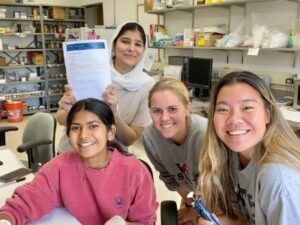
Every year, the COE awards fellowships to fund summer research opportunities for Wesleyan students across all majors and class years. Sophie Scobell ‘22 is a biology and East Asian studies double major. Aashni Parikh ‘22 is an earth & environmental sciences and biology double major. Scobell and Parikh, along with Fatima Ejaz, ’22 and Helen Lei ’23, spent the summer in the Chernoff Lab, setting out to sequence what will be only the fifth fully sequenced fish genome.
You spent your summer working in Professor Chernoff’s lab. Tell us about your experience!
This summer we began a new project in the Chernoff lab, setting out to sequence the Longnose Dace, Rhinichthys cataractae genome. These fish are riffle-dwelling minnows in Connecticut streams that we use to study the effects of natural barriers on population genetics and evolution. We spent our time in June and July developing a DNA extraction protocol, learning how to use the MinION in-lab sequencing device, and setting up a bioinformatics pipeline to assemble our final sequence.
How did you get interested in DNA sequencing and what did you hope to learn this summer?
For the past two years in the lab, we’ve looked at microsatellites: noncoding, repeating fragments of DNA that can serve as markers of evolutionary distance and relatedness between populations. Our study of microsatellites has proven to be useful, but it does have limitations. Since the closest reference genome for our studies has been the Zebrafish, a species that diverged 150 million years ago, we realized a need for a fully sequenced Longnose genome to improve the depth and quality of our research. We are excited to be sequencing what will be only the fifth fully sequenced fish genome!

Our hope for this summer was to learn more about the MinION sequencing device–how it works and the bioinformatics pipeline that follows the molecular component. Over this summer, we can confidently say that our understanding of both the molecular and computational aspects of the sequencing procedure has increased. We were surprised by how difficult it would be to follow a protocol and troubleshoot throughout the process. Fortunately, we were able to successfully complete five runs toward the end of the research program.
What was the most rewarding part of your experience…and your biggest challenge!
The most rewarding part of this experience was when we successfully completed our first run using the device. It was really exciting to be using cutting-edge technology and looking at our results in real time. While we still have a lot to do, our hard work had paid off and it’s encouraging to see that we’re moving in the right direction.
Our biggest challenge was figuring out how to produce the highest quality, highest concentration of DNA to use for sequencing. Some of our solutions included using wider-mouthed pipet tips when handling DNA (recommended by Professor Joseph Coolon) and storing our DNA in a buffer in the refrigerator (recommended by a professor at another university). Advice from those with more experience in genomic DNA was extremely important in our being able to progress with our project!

What transferable skills will take with you as you move forward?
This experience taught us the importance of and the power of collaboration in scientific research. From conferring with Professor Chernoff to getting advice from graduate students and other professors at Wesleyan to capitalizing on connections at other research universities and posting questions in the sequencing community forum, we were able to troubleshoot issues at each step in the process. Also, working in a group with a total of four undergraduate students and two professors, we delegated tasks and learned how to efficiently get tasks done while ensuring each team member was learning the skills and background behind each step. The positive impact of teamwork and collaboration on our summer work has reminded us to incorporate these points in any sort of work.
Any words of advice for other Wes students who might be interested in applying for a COE fellowship?
A piece of advice for other Wes students would be to choose and apply for a research project that they are very passionate about. Since you’re working on the same project every day for two months, it’s much more enjoyable when you’re excited about what you’re working on…at least that’s what made the experience for so enjoyable for us! It’s also important to ensure that you get along with your fellow team members. The four of us in the lab really depended on each other at every step of the process, which helped make the work more efficient and more fun!